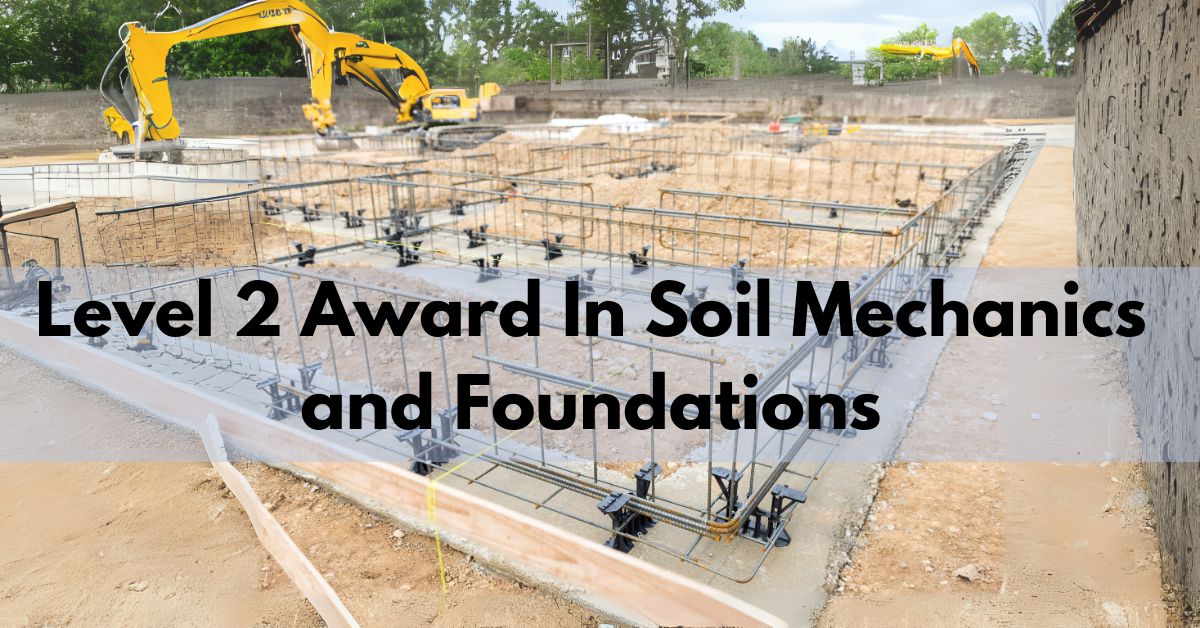
Level 2 Award In Soil Mechanics and Foundations
Course Overview
The Level 2: Soil Mechanics and Foundations course provides learners with in-depth knowledge of soil behavior and its role in supporting structures. Participants will gain theoretical and practical expertise in analyzing soil properties, designing foundations, and addressing challenges in geotechnical engineering. This course is ideal for those aiming to excel in civil engineering, construction, and infrastructure development projects.
Benefits
- Specialized Knowledge: Learn critical concepts of soil mechanics and foundation engineering.
- Practical Skills: Gain hands-on experience in soil testing and foundation design techniques.
- Career Growth: Build expertise for roles in geotechnical and civil engineering.
- Problem-Solving Abilities: Address challenges in soil-structure interaction and construction.
- Global Recognition: Achieve a certification valued in civil engineering and construction industries.
Learning Outcomes
By completing this course, participants will:
- Understand the principles of soil mechanics and foundation engineering.
- Analyze soil properties and assess their suitability for construction projects.
- Design safe and efficient foundations for various structures.
- Address geotechnical challenges like settlement, stability, and soil compaction.
- Apply soil mechanics concepts to practical construction scenarios.
Study Units
- Introduction to Soil Mechanics:
- Basic concepts and significance in civil engineering.
- Classification and properties of different soil types.
- Soil Testing and Analysis:
- Laboratory and field tests to determine soil properties.
- Understanding permeability, compaction, and shear strength.
- Stress Distribution in Soil:
- Stress due to structural loads and its impact on soil behavior.
- Settlement analysis and mitigation techniques.
- Slope Stability and Earth Pressure:
- Principles of slope stability and retaining wall design.
- Calculating and managing lateral earth pressures.
- Foundation Engineering Basics:
- Types of foundations: shallow and deep.
- Factors influencing foundation design and construction.
- Soil Improvement Techniques:
- Methods to enhance soil strength and stability.
- Use of geosynthetics and chemical stabilization.
- Geotechnical Case Studies:
- Real-world examples of soil mechanics and foundation challenges.
- Lessons learned from successful and failed projects.
Course Outline
- Introduction to Soil Mechanics and Its Importance:
- Overview of soil behavior and its role in structural stability.
- Applications in civil and geotechnical engineering.
- Soil Classification and Properties:
- Determination of physical and mechanical properties.
- Methods for soil categorization and suitability assessment.
- Foundation Design Principles:
- Load-bearing capacity and settlement criteria.
- Design of shallow and deep foundations, including pile and raft foundations.
- Soil Testing Techniques:
- In-depth study of field and laboratory testing methods.
- Data interpretation for foundation design.
- Slope Stability and Retaining Structures:
- Techniques for analyzing slope stability.
- Design considerations for retaining walls and embankments.
- Ground Improvement Techniques:
- Soil compaction, drainage systems, and stabilization.
- Role of advanced materials in improving soil performance.
- Practical Applications and Case Studies:
- Analyzing project-based challenges in soil mechanics.
- Group discussions on innovative solutions for geotechnical problems.
Career Progression
Graduates of the Level 2: Soil Mechanics and Foundations course can pursue:
- Geotechnical Engineering Roles: Work as a Geotechnical Engineer, Soil Testing Specialist, or Foundation Design Engineer.
- Infrastructure Projects: Opportunities in highway construction, bridge design, and urban development.
- Higher Certifications: Advance to Level 3 or specialized courses in geotechnical or foundation engineering.
- Consultancy Services: Offer expertise in soil analysis and foundation solutions to construction firms.
- International Opportunities: Join multinational projects requiring advanced geotechnical knowledge.
Why Choose Us?
- Expert Faculty: Learn from industry professionals with extensive geotechnical experience.
- Cutting-Edge Tools: Access state-of-the-art testing equipment and software.
- Globally Recognized Certification: Enhance your professional profile with a trusted credential.
- Practical Focus: Engage in real-world scenarios and project-based learning.
- Ongoing Support: Receive personalized guidance throughout and after the course.
Strengthen your foundation in geotechnical engineering!
Enroll in the Level 2: Soil Mechanics and Foundations course today and gain the expertise to excel in civil engineering and construction.
Our assessment process is designed to ensure every learner achieves the required level of knowledge, skills, and understanding outlined in each course unit.
Purpose of Assessment
Assessment helps measure how well a learner has met the learning outcomes. It ensures consistency, quality, and fairness across all learners.
What Learners Need to Do
Learners must provide clear evidence that shows they have met all the learning outcomes and assessment criteria for each unit. This evidence can take different forms depending on the course and type of learning.
Types of Acceptable Evidence
Assignments, reports, or projects
Worksheets or written tasks
Portfolios of practical work
Answers to oral or written questions
Test or exam papers
Understanding the Structure
Learning outcomes explain what learners should know, understand, or be able to do.
Assessment criteria set the standard learners must meet to achieve each learning outcome.
Assessment Guidelines
All assessment must be authentic, current, and relevant to the unit.
Evidence must match each assessment criterion clearly.
Plagiarism or copied work is not accepted.
All learners must complete assessments within the given timelines.
Where applicable, assessments may be reviewed or verified by internal or external quality assurers.
Full learning outcomes and assessment criteria for each qualification are available from page 8 of the course handbook.
Top Courses
No results found.
Related Courses
Let's Get in touch
Deleting Course Review
Course Access
This course is password protected. To access it please enter your password below:



